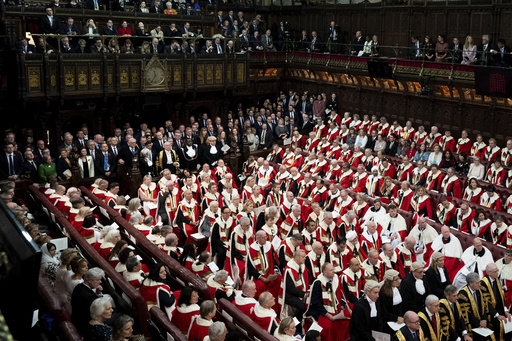LONDON — Following a tradition spanning centuries, the Earl of Devon has held a seat in Parliament, contributing to the legislative process. However, this might soon come to an end.
On Tuesday, UK lawmakers are scheduled to deliberate on a bill aimed at revoking the right of hereditary aristocrats to sit and vote in the House of Lords, a practice that has persisted for over 700 years. The Labour Party government asserts that this move represents a necessary progression in the long-awaited reform of the upper house of Parliament, indicating a desire to eliminate what they describe as an “outdated and indefensible” institution.
“Within the framework of the 21st century, it’s inappropriate for our Parliament—responsible for crafting our laws—to have seats allocated to individuals solely because of their lineage,” said Constitution Minister Nick Thomas-Symonds as he introduced the bill for debate in the House of Commons.
He pointed out that the UK is one of only two nations, alongside Lesotho, that retains a hereditary aspect in its parliamentary structure.
Nonetheless, Lord Devon expresses caution regarding potential changes to the UK’s unwritten constitution, which he believes has withstood numerous challenges for over a millennium.
“The fact that I hold a position conferred by Empress Matilda to my ancestor in 1142—and it remains relevant and functional—is a significant testament to continuity and stability,” stated the earl, who is a 49-year-old attorney named Charles Peregrine Courtenay.
The UK Parliament consists of two chambers: the House of Commons, where representatives are directly elected from 650 constituencies nationwide, and the unelected House of Lords. Historically, the Lords was primarily comprised of male noble members, with voting rights inherited alongside their aristocratic titles. The latter half of the 20th century saw the introduction of “life peers” — distinguished individuals such as former politicians and community leaders appointed by the government.
In 1999, a significant reform occurred under former Prime Minister Tony Blair’s administration, which resulted in the removal of the majority of hereditary peers from the Lords. However, to prevent backlash from the aristocracy, 92 were permitted to maintain their positions temporarily.
Now, 25 years later, those peers remain, primarily composed of an aging male demographic averaging around 70 years. Upon the death or retirement of a peer, elections among the remaining aristocrats are held for replacements. Courtenay became part of the House of Lords in 2018, succeeding through an election with 19 candidates and merely 31 eligible voters.
Members of the House of Lords do not receive a salary but can claim daily expenses, with the opportunity to utilize subsidized dining facilities within Parliament. Their tenure is indefinite unless they opt to retire or are recently expelled for lack of attendance.
The ongoing appointments by various governments have led to an overpopulated Lords, currently at around 800 members, making it the second-largest legislative chamber worldwide, following China’s National People’s Congress.
The opposition Scottish National Party has proposed an initiative to completely eliminate the House of Lords; however, this suggestion appears unlikely to gain traction. The Labour Party continues to advocate for the eventual establishment of an alternative second chamber that reflects the demographic diversity of the UK.
Although the Conservative party has more representation within the Lords, some members, including Courtenay, remain independent. Nonetheless, certain left-leaning factions have come to appreciate the House of Lords for its role in moderating the controversial measures advanced by the previous Conservative government, especially regarding Brexit and immigration policy.
Given Labour’s substantial majority in the House of Commons, it is highly probable that the bill will be forwarded for further examination. To be enacted, it must also navigate the House of Lords, which holds the authority to delay and amend any legislation passed by the Commons but cannot outright block it. The bill is expected to become law within the next year.
Courtenay, who oversees Powderham Castle and a 3,500-acre estate in Devon, shows acceptance of the possibility that he will be the final member of his esteemed family to serve in Parliament.
“We were instrumental in the coronation of Henry VII, fought alongside the Black Prince at the Battle of Crécy, and provided financial support for the Agincourt campaign in 1415. Additionally, we were related to Henry VIII until he executed one of our ancestors,” he recounted. “So, throughout history, we have had considerable involvement in governmental affairs.
“Beyond those historical highlights, our focus has been on supporting Devon and aiding the community—a lengthy and fulfilling service that will persist.”



